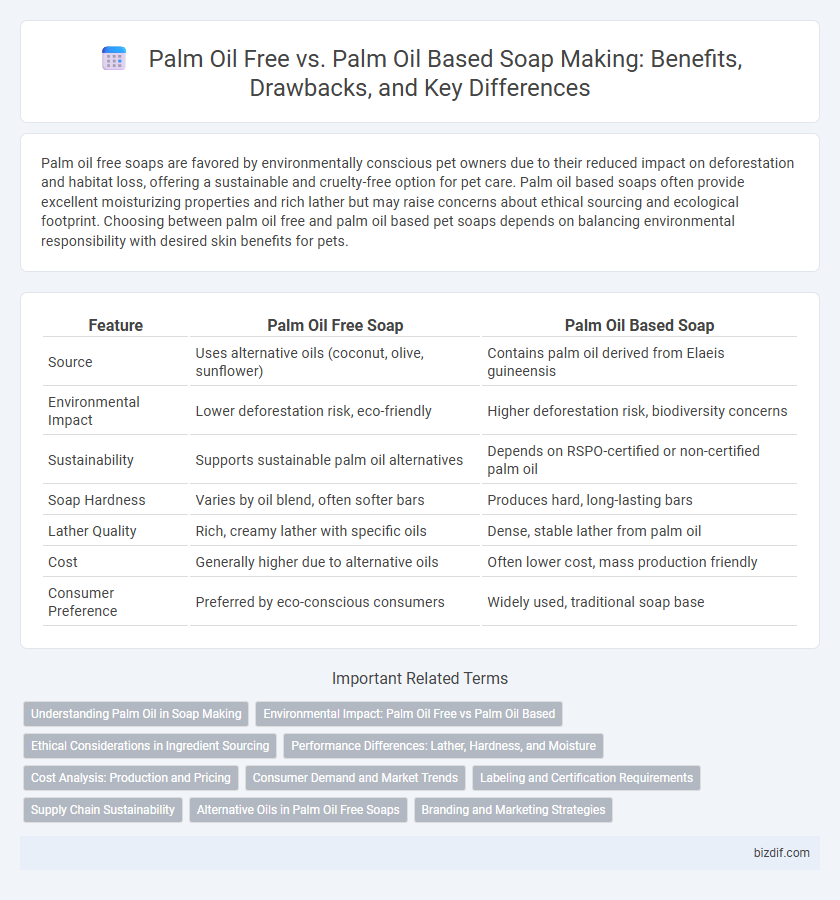Palm oil free soaps are favored by environmentally conscious pet owners due to their reduced impact on deforestation and habitat loss, offering a sustainable and cruelty-free option for pet care. Palm oil based soaps often provide excellent moisturizing properties and rich lather but may raise concerns about ethical sourcing and ecological footprint. Choosing between palm oil free and palm oil based pet soaps depends on balancing environmental responsibility with desired skin benefits for pets.
Table of Comparison
| Feature | Palm Oil Free Soap | Palm Oil Based Soap |
|---|---|---|
| Source | Uses alternative oils (coconut, olive, sunflower) | Contains palm oil derived from Elaeis guineensis |
| Environmental Impact | Lower deforestation risk, eco-friendly | Higher deforestation risk, biodiversity concerns |
| Sustainability | Supports sustainable palm oil alternatives | Depends on RSPO-certified or non-certified palm oil |
| Soap Hardness | Varies by oil blend, often softer bars | Produces hard, long-lasting bars |
| Lather Quality | Rich, creamy lather with specific oils | Dense, stable lather from palm oil |
| Cost | Generally higher due to alternative oils | Often lower cost, mass production friendly |
| Consumer Preference | Preferred by eco-conscious consumers | Widely used, traditional soap base |
Understanding Palm Oil in Soap Making
Palm oil is a common ingredient in soap making due to its ability to create a hard, long-lasting bar with a creamy lather; however, concerns about deforestation and sustainability have driven some artisans to choose palm oil free alternatives like coconut, olive, or shea butter. Palm oil based soaps offer affordability and stability but raise environmental and ethical questions related to habitat destruction and biodiversity loss. Understanding the impact of palm oil sourcing helps soap makers balance performance qualities with eco-conscious production choices.
Environmental Impact: Palm Oil Free vs Palm Oil Based
Palm oil based soaps contribute significantly to deforestation, habitat loss, and increased greenhouse gas emissions due to large-scale palm plantations. Palm oil free alternatives often utilize sustainably sourced oils such as coconut, olive, or sunflower, which generally have a lower environmental footprint and support biodiversity conservation. Choosing palm oil free soaps helps reduce the demand for unsustainable palm oil production, aiding in the preservation of tropical rainforests and endangered species.
Ethical Considerations in Ingredient Sourcing
Palm oil free soaps avoid palm oil, addressing deforestation, habitat loss, and labor rights violations often associated with palm oil production. Palm oil based soaps can be ethically sourced when certified by organizations like RSPO, ensuring sustainable practices and fair trade. Choosing soaps with transparent ingredient sourcing supports environmental conservation and social responsibility in the soap making industry.
Performance Differences: Lather, Hardness, and Moisture
Palm oil-free soaps typically produce a creamier, denser lather compared to palm oil-based soaps, which tend to create a lighter, fluffier foam. In terms of hardness, palm oil enhances soap durability, resulting in longer-lasting bars, whereas palm oil-free variants may become softer and dissolve faster. Moisture retention is generally higher in palm oil-free soaps due to alternative oils like coconut or olive oil, which provide better hydration but may reduce the soap's longevity.
Cost Analysis: Production and Pricing
Palm oil-free soap typically incurs higher production costs due to the use of alternative oils like coconut, olive, or shea butter, which can be more expensive and less readily available than palm oil. Palm oil-based soap benefits from the lower price and high yield of palm oil, making production more cost-efficient and resulting in lower retail prices. Variations in supply chain stability and consumer demand also influence the cost structure and pricing strategies of both soap types.
Consumer Demand and Market Trends
Consumer demand for palm oil-free soap is rising due to environmental concerns and ethical sourcing preferences, driving manufacturers to develop sustainable alternatives. Palm oil-based soaps remain popular for their moisturizing properties and cost-effectiveness, maintaining a strong market presence despite growing scrutiny. Market trends indicate a shift towards transparent labeling and eco-friendly formulations, reflecting heightened awareness and evolving consumer values.
Labeling and Certification Requirements
Palm oil free soaps must clearly indicate the absence of palm oil on their labeling, often highlighting alternative sustainable ingredients to attract eco-conscious consumers. Palm oil based soaps require certification such as RSPO (Roundtable on Sustainable Palm Oil) to verify sustainable sourcing and legal compliance. Both types need transparent ingredient disclosure to meet regulatory standards and build consumer trust in their environmental impact claims.
Supply Chain Sustainability
Palm oil free soaps rely on alternative oils such as coconut or olive oil, reducing deforestation and habitat destruction linked to palm oil cultivation. Palm oil based soaps benefit from established supply chains but often face scrutiny over environmental impacts and labor practices within palm plantations. Sustainable sourcing certifications and traceability initiatives are critical to enhancing the supply chain transparency and environmental responsibility of palm oil used in soap making.
Alternative Oils in Palm Oil Free Soaps
Palm oil-free soaps often utilize alternative oils such as coconut oil, olive oil, and shea butter, which provide moisturizing properties and create a rich lather without the environmental concerns associated with palm oil production. These oils offer unique fatty acid profiles that contribute to soap hardness, cleansing ability, and skin conditioning, making them sustainable substitutes. By choosing palm oil-free formulations, manufacturers support biodiversity conservation and reduce deforestation linked to palm oil plantations.
Branding and Marketing Strategies
Palm oil free soap brands emphasize ethical sourcing and environmental sustainability to attract eco-conscious consumers, leveraging keywords like "cruelty-free," "deforestation-free," and "vegan-friendly" in marketing campaigns. Palm oil based soap brands highlight affordability, rich lather, and moisturizing properties, targeting budget-conscious shoppers and emphasizing product effectiveness through testimonials and ingredient transparency. Both strategies focus on brand positioning to create distinct market niches, utilizing social media storytelling and certification labels to build consumer trust and loyalty.
Palm Oil Free vs Palm Oil Based Infographic

 bizdif.com
bizdif.com